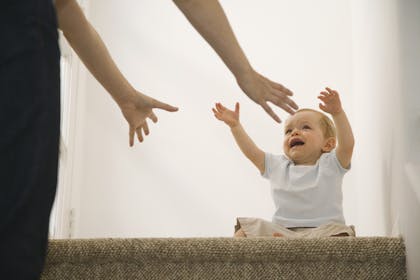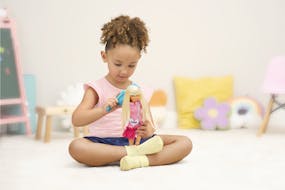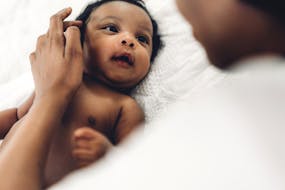Separation anxiety is a common stage of a baby’s development. It can be difficult, but they’ll usually grow out of it. Here's how to manage separation anxiety.
Separation anxiety can be upsetting to deal with as a parent, but according to the NHS , it is a natural stage in your child's development. To help you get through this difficult phase in your little one's life, it can be helpful to understand what's going on with your baby, and why.
What is separation anxiety?
Separation anxiety is when babies and toddlers get clingy or cry if you (or any of their other carers) leave them , even if it's only for a short amount of time.
It can be difficult to see your baby crying when you leave them, but i t's important to remember that both separation anxiety and a fear of strangers are common for babies and young children .
FREE NEWBORN NAPPIES
The NHS says that separation anxiety usually happens between the ages of six months and three years old , but it's something that children usually grow out of – so, as upsetting as it is, remember that this will pass!
- Learn more about helping your baby to deal with separation anxiety at night .
It's also important not to feel guilty when your baby cries, although this can be easier said than done! Remember that this is normal for your child, and it's also good for their development and sense of independence to learn that people will leave and then come back.
Why does separation anxiety happen in babies?
According to NHS guidance , separation anxiety usually kicks in around the time that your baby starts to distinguish one person from another – and they realise that they are their own separate person. This means that they also start to realise how dependent they are on you and the other people that care for them (whether that's parents, grandparents, or professionals).
At this stage, your baby starts to realise that, when you leave the room, it's possible that you might not come back.
This realisation can make babies develop a newfound clinginess to the people who care for them, and they might cry whenever you're not there, or when strangers are around.
Even though it might not feel like it, this stage of your baby's development Is actually a positive sign, as it shows not only how much increased awareness they have of their surroundings, but also how attached they are to you.
So, while it can be a shock when your baby stops being calm when you leave the room and is no longer happy to be held by people they don't know, remember that it's normal.
What are the signs of separation anxiety in babies?
You’ll know your baby has separation anxiety if they cry when you, or anyone looking after them, goes out of sight.
Other signs of separation anxiety in babies include:
Your baby cries if they are left with someone else
It could be anyone from your childminder to your own mum, or even your partner! If your baby has separation anxiety, the only person they want is
you
. And as before, even though it definitely won’t feel like it, this is a good sign that they trust you and that they have developed a strong bond with you.
Your baby doesn’t want to play on their own
Even if your baby was always quite happy to play with their favourite toy on their own, this may no longer be the case if they have separation anxiety. Instead, they'll want you to be next to them and will get upset if you leave.
This is down to them starting to understand the idea of ‘object permanence’. Until now, your baby probably thought that people and things only existed when they were in sight. Now, your little one is starting to understand that you still exist even when they can't see you – and they want you back!
Your baby might start to have problems sleeping
You’ve just got their sleeping sorted, and then separation anxiety means it’s disrupted again, with them waking up throughout the night. Even something as simple as bedtime can be a cause of anxiety for your baby. When you leave their room, they have no way of knowing if you will come back.
- Find out more about your baby's sleep .
Your baby might start waking up early
Again, this feeling of anxiety can cause your baby to wake up early and then not be able to go back to sleep, and this can mean that they start waking up earlier than usual.
How to deal with separation anxiety in babies
For most people, it's simply not practical to have your baby with you 24/7. Separation might happen when you simply leave the room that your baby is in, when they're being held by a new person, or when there are strangers around. It can also happen when you leave your baby at nursery or to be looked after by a friend, relative or childminder.
This can be particularly hard, especially if your child cries when you leave them to be looked after.
Again, remember that your child will grow out of this, but in the meantime, there are things you can do to help you both deal with separation anxiety. This will help them to feel more secure, and they'll learn that when you leave, you will be coming back.
You might find it helpful to try some of the following suggestions from the NCT :
Practise short separations
If your baby is showing signs of anxiety about being apart from you, it might help to practise some shorter separations first.
To start with, you could leave your baby with a friend or family member for a few minutes (someone that they still know well). Then, each time you leave gradually build up to a longer period of time, and start to leave your baby in more unfamiliar surroundings.
First, just go into another room and come back. Once baby is used to that, try a longer trip like popping to the shops – each time, your baby will learn that when you leave, you do come back again! Eventually, they should feel more comfortable being left with other trusted carers for longer periods.
Never leave without saying goodbye
It can be tempting to dash off when your baby isn’t looking in the hope this will stop them from getting upset. In reality, they are more likely to be more upset that you’ve suddenly vanished.
Instead, make your ‘goodbye’ a positive thing
If you look – and act – happy and relaxed about your goodbye, your baby will (in time) mirror that. On the flip side, if you are anxious about leaving them, they're likely to pick up on those emotions.
Keep goodbyes short
Make your goodbye short but positive. Give your baby a kiss and wave goodbye before leaving. Even if you can hear them crying as you leave, don’t go back into the room, as this will only prolong their upset. The good news is that many babies stop crying soon after their parent leaves.
However, the NCT does also suggest hanging around the first few times that you drop your child off somewhere new. That way they can get accustomed to the new environment, whether it's a childminder's house or nursery, with your comforting presence.
Give your baby something that reminds them of you
It might help your baby to give them something that reminds them of you, like a scarf, piece of clothing or toy that smells like you. Alternatively, make sure your baby has a familiar toy that they can cuddle. This can help reassure and comfort them until you return.
What to do if you're worried about your baby's separation anxiety
While separation anxiety is a normal part of your baby's development, it's still important that their anxiety doesn't stop them from enjoying new experiences, like going to nursery or being around new people – and it's important that it doesn't stop you leaving them or going to work too.
If you're concerned that your baby's separation anxiety is continuing to cause them a lot of upset and distress, and they're upset for a long time after you've left them, then talk to your health visitor for some advice .
Need advice?
Our health visitors and nursery nurses are online Monday to Friday evenings to answer your queries on feeding, sleep and child health.
Did your baby develop separation anxiety? And if so, how did you deal with it? We'd love to hear your experiences and advice. Or check out our articles below for more info ...
Related stories
How to cope with separation anxiety at night







